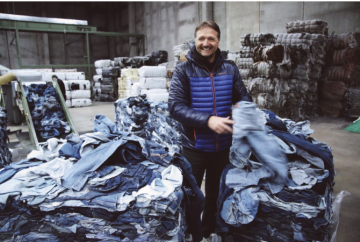Ethical Conversations
Ethical Conversations: A Talk with Nubikk

"At Nubikk, we don't want to pretend to be at the forefront. But by weaving sustainability into our DNA, we are taking steps forward every day."
13 SEPTEMBER 2024
Otrium is committed to the mission that all clothing produced should be worn. While no item or fashion brand can be perfectly 'ethical,' there are many areas where brands can make significant improvements. We want to support fashion companies striving for more responsible fashion and empower consumers to understand what this journey entails.
In our Ethical Conversations series, we’re exploring the approaches of some brands featured on Otrium. This time, we spoke with Nubikk. The brand’s Operations Manager, Inge, and Marketing Manager, Leontine explained how they try to conduct business in a more responsible way.
How did Nubikk’s journey towards a more responsible approach begin?
It all started with the founder, Daan Baeten. His reason for finding Nubikk was to create durable premium quality shoes. Around 6 years ago, we started accelerating our responsibility efforts, which was encouraged by one of our biggest clients: the Bijenkorf. They only wanted to work together with shoe brands that were audited and certified by several sustainability labels, like LWG or BSCI. At the time, we also became a member of the Leather Working Group (LWG) and encouraged our suppliers to work with certified leather only.
What sustainability initiatives does Nubikk have?
At Nubikk, we don't want to pretend to be at the forefront. But by weaving sustainability into our DNA, we are taking steps forward every day. Here are a few of our initiatives:
1. We work on our supply chain
We produce our entire collection in Europe, mostly in Portugal. Also, our factories all adhere to our Code of Conduct and Business Social Compliance Initiative, ensuring that suppliers adhere to environmentally and socially responsible practices, with a particular focus on improving working conditions and labour rights. Moreover, our main leather suppliers are members of the Leather Working Group (LWG) and meet rigorous standards for responsible sourcing and reduced environmental impact.
2. We offer repair services
We strive to deliver perfect products, but damages or defects sometimes occur. In such cases, we try to repair the products through one of our experts. Only if repair isn’t possible do we offer an alternative solution. To extend the life of damaged shoes, for example, we provide our customers with eyelets, laces, and other parts.
3. We give returns a second chance
Products that are returned or exchanged due to minor imperfections are given a second chance through a local sample sale or an external partner.
How do you involve consumers in sustainability?
Something small we do is that we encourage our customers to return broken shoes for repairs, instead of throwing away a shoe because of a minor issue. In 2023 we successfully repaired 470 pairs. Next to this, we also provide informative content about our responsibility efforts on our website to help customers make informed decisions.
How is Nubikk different from other shoe brands?
Our mission statement, "Lightweight is our luxury standard," emphasises comfort and quality. All our shoes, from high-knee boots to sneakers, are lightweight, comfortable, and made from high-quality materials. We see that customers value this approach via their positive reviews.
What is the biggest challenge for Nubikk when it comes to sustainability?
The number of returns is a big sustainability challenge. Many consumers order two pairs of shoes and return the ones that don’t fit. To solve this, we try to inform our customers as much as possible. We offer a 3D and virtual try-on tool and an extensive Size Advice tool with a sizing chart and guide on our website.
And what are your biggest goals?
In addition to complying with the Corporate Sustainability Reporting Directive, we are committed to pursuing our own goals. One major objective is to map the environmental footprint of all our products and be able to show where each component is made. Next to this, our aim is to ensure that all our shoes are 100% LWG-certified.
What is going well in the fashion industry?
Environmental awareness is increasing within larger companies. Scandals often accelerate this trend. Although such scandals can be unfortunate for the brands involved, they do accelerate greater supply chain transparency.
… and what really needs to change?
It’s unfortunate that many fast-fashion brands release excessive amounts of clothing each year. The focus should shift to producing timeless, high-quality pieces. Additionally, the volume of returns and their disposal is alarming. Fortunately, several organisations have developed innovative solutions to address the issue of returns.
What is the biggest misconception about sustainable clothing?
Many people might believe environmentally conscious clothing is boring, but it’s quite the opposite. A company's challenge is to make its responsibility story aesthetically pleasing.
Name a change that a consumer could make to become more environmentally conscious.
When choosing shoes, consumers should opt for the ones that suit them and can be worn in many ways. Once the perfect pair is found, proper care is essential to ensure they last longer.

More from Otrium
See all articles
Ethical Conversations
Ethical Conversations: A Talk with Mud Jeans
Otrium is committed to the mission that all clothing produced should be worn. While no item or fashion brand can be perfectly 'ethical,' there are many areas where brands can make significant improvements. We want to support fashion companies striving for more responsible fashion and empower consumers to understand what this journey entails.
In our Ethical Conversations series, we’re exploring the approaches of some brands featured on Otrium. This time, we chatted with Bert, founder of Mud Jeans, and Lea, a member of their sustainability team.
Tell me, who are you, and what is your role at Mud Jeans?Bert: My name is Bert van Son, and I founded Mud Jeans. With 30 years of experience, I’ve seen fast fashion's negative impact on the environment. This motivated me to seek a better alternative. In 2012, I introduced the "Lease A Jeans" concept, allowing customers to lease jeans and after use return them for recycling. This initiative reduces waste and promotes a circular economy in fashion, enabling customers to renew their wardrobes more sustainably.
Lea: Hi, I'm Lea, and I studied Sustainability Science, Policy & Society at Maastricht University. My passion for fashion and the well-being of people and the planet led me to a career in sustainable fashion. I am happy to be working at Mud Jeans, where I manage all aspects of corporate responsibility.
Where did it all start for Mud Jeans?Bert: I've been in the fashion industry for quite some time. I started my career in Taiwan and later in Hong Kong, where I saw the industry transform into something I didn't like—dreadful production processes, poor working conditions, you know the story… Wanting to make a change, I sold my previous company and used the funds to start Mud Jeans. I specifically chose jeans because I realised that to truly do something different, I should focus on an item that is widely worn and has one of the most challenging supply chains.What sustainability initiatives do Mud Jeans have?Bert: One of our standout initiatives is our circular economy model. After customers have worn out their jeans, they can return them to us. We then send these pairs to Spain, where factories break the items down into their original raw materials. We reuse this bluish cotton, combined with new organic cotton, to create our jeans. Compared to industry-standard jeans, our production process uses significantly less water—about 25 minutes of showering versus 7.5 hours for a regular pair. Also, transparency is one of our core values: we strongly believe all companies should be truthful about their processes.
Lea: Additionally, we release a sustainability report and conduct a life cycle assessment (LCA) annually to provide detailed insights into our practices. Last year, we introduced an innovative LCA-based approach that evaluates our jeans against a hypothetical product with similar manufacturing processes but without more conscious materials. This method goes beyond comparing our jeans against industry standards and allows us to make more accurate impact assessments. What's more, our approach to sustainability goes beyond environmental concerns and considers social responsibility. We prioritise fair wages and good working conditions throughout our supply chain so that our practices benefit both people and the planet.
How do you involve consumers in sustainability?Bert: Since 2012, we've encouraged consumers to return their jeans after they’ve worn them out. This concept of retaining ownership of materials and offering jeans on a leasing basis demonstrates our commitment to being different. While we primarily appeal to environmentally conscious consumers—which we call dark green customers—we want to reach a broader audience, as more responsible purchasing benefits everyone.
Lea: We aim to share the Mud Jeans story with all segments and sell our jeans to every consumer. However, effectively communicating our efforts to various audiences remains an ongoing challenge. You don’t want to bore people with the same story, but you can’t keep quiet either.
What sets Mud Jeans apart?Bert: At Mud Jeans, circularity is at the core of everything we do. We're dedicated to reclaiming our products after use and creating a closed-loop, post-consumer waste denim process named “Denim Reborn”. Also, initiatives like "Lease a Jeans" and maintaining close relationships with our supply chain partners show our commitment.
What is the biggest challenge for you when it comes to sustainability?Bert: We want to inform people about everything we do while also attracting them with the good fit and nice wash. Balancing this desire to communicate our efforts with the need to appeal to consumers is a challenge. Moreover, being a volume-driven industry, maintaining competitive prices while adhering to better practices remains an ongoing struggle.
Lea: I also see societal challenges, which are increased by rapidly changing consumer trends. People see so much fashion content on TikTok and Instagram that they feel they need to have it all. We’re trying to come up with innovative solutions to keep up with the trends sustainably, but it is rather difficult!
What are the main goals for Mud Jeans?Bert: Our ultimate goal is to produce jeans made entirely from post-consumer waste. While we've made significant steps and currently incorporate up to 40% recycled materials into our jeans, achieving 100% recycled denim remains our ambition.
What is going well in the fashion industry?Lea: Positive developments happening in this industry are increased sustainability regulations. Regulations play a crucial role in forcing companies in the fashion industry to adopt more responsible practices, closing the gap between awareness and action.
And what really needs to change?Bert: For the industry to change, a collective effort involving manufacturers, government intervention, and consumer behaviour change is necessary. All three need to contribute to the transformation. Also, encouraging responsible production practices, enacting supportive legislation, and fostering a shift in consumer mindset are all important measures.
Lea: Examples like undefined show the difference between consumer intentions and actions. Despite people wanting change regarding sustainability, there needs to be more consumer engagement to support innovation, emphasising the need for efforts across those three fronts Bert mentioned [i.e. encouraging responsible production practices, enacting supportive legislation, and fostering a shift in consumer mindset].
What is the biggest misconception about sustainable clothing?Bert: One prevalent misconception about sustainable clothing is that it is not fashionable. People are often pleasantly surprised by the quality and looks of our jeans, despite them being labelled as more sustainable. Some consumers are just not used to purchasing more sustainable products and associate them with a hippie or bohemian aesthetic.
Name a change consumers could make to become more conscious.Bert: The most important adjustment consumers should make is to prioritise quality over quantity. Buying one high-quality pair of jeans is more conscious than purchasing multiple low-quality options. Consumers should think of spending money like voting with their wallets and supporting companies that are doing something good for people and the planet.
P.S. TIP: Watch the documentary "True Cost" and read the book "Doughnut Economy" for further insights into sustainable practices.

Ethical Conversations
Ethical Conversations: A Talk with Alchemist
Otrium continually works towards the mission that all clothing produced should be worn. There is no such thing as a perfect, “ethical” item or fashion brand: it’s not a black-and-white topic. There are, however, a lot of improvements brands can work on. We want to support fashion companies that strive to do better and empower you to understand what this journey entails. In this Ethical Conversations series, we’re exploring the approaches of some brands featured on Otrium. This time, we interviewed Caroline Mewe, the Founder of Alchemist.
Great to meet you! I’m curious to hear how the idea behind Alchemist came about.After my studies, I joined the Dutch department store Bijenkorf as a buyer, which I loved. I travelled around the world, enjoying every single moment. Through this experience, I was able to get a close look at the different sides of fashion: on the one hand, the world of glitter & glamour, and commercialisation, and on the other, the stark reality of the industry. I visited clothing manufacturers where I couldn't tell if it was a chicken coop or a factory. It was terrible to see people working in the circumstances that we consider unacceptable in Europe. At some point, I could no longer ignore it. That's when I founded Alchemist. This was 20 years ago.Please tell me more about Alchemist's sustainability initiatives.First and foremost, we source and select the most sustainable fabric options. At the same time, we are very strict about choosing our production partners. I am thrilled with the materials Alchemist uses. Take our wool, for example, it holds the following certifications: Responsible Wool Standard Certification (RWS), Global Recycled Standard (GRS), and The International Alpaca Association (I.A.A). We buy our alpaca and merino wool from certified suppliers where the animals don’t have to suffer. We don’t use any leather or fur, and we are non-mulesing (mulesing is the removal of strips of wool-bearing skin around the breech of the sheep). I have always found it very important to keep the well-being of animals in mind. As a mother, I taught my sons that food is not a given. It is essential to see the value of the “obvious “ things we often take for granted.
How do you involve consumers on the topic of sustainability?By nature, I am not a very loud person. This translates into Alchemist, but we could do much more to share our sustainability efforts. While you can find what we do on our website, it doesn’t even cover half of what we initiate and undertake. We speak about our efforts with retail buyers in our showrooms and directly with consumers at sale points. That is our strong suit.
How is Alchemist different from other fashion brands?The passion for Alchemist comes from within the team, from a place of joy and love. When you think about it, we don’t produce large numbers. But we create beautiful clothes with a personal touch. You have to keep the fun in this loaded industry.
What is the biggest challenge for you when it comes to sustainability?As long as the big companies don’t start using better materials in larger quantities, these fabrics will hit the market less. When these materials are produced on a small scale, the prices are too high to compete with regular materials. At Alchemist, we want to show that the industry can use more responsible materials to create beautiful clothing!
And your biggest goals?Apart from changing external legislation factors, we must continue and evolve with what we're doing now at Alchemist. This may mean we have to scale down or look at reuse. There’s a lot that could be done. By the way, we want to become a certified B Corp! That’s one of our key goals.
What is going well in the fashion industry?Awareness is growing. Now factories in India provide the option for better materials and “green” certificates, without being asked. All our suppliers have at least one social certificate and undergo annual audits of several NGOs. We require nine criteria for the production of our clothing, including no child labour, safe working conditions, and fair living wages. And more factories - which I've visited, at least - are looking at the basic needs of workers. When I started twenty years ago, this didn’t exist!
And what REALLY needs to change?Laws and regulations need to change. Take, for instance, implementing a checklist at the Port of Rotterdam for every fashion brand that imports clothing. This checklist would ensure no child labour is involved, materials are respectful of the planet, and so forth. There also needs to be a shift in mindset: people should accept that ethically produced clothing may have a higher price tag, but that this reflects the actual cost of what it took to produce it.
What is the biggest misconception about sustainable clothing?The biggest misconception is that beautiful clothes can be produced responsibly. In reality, it’s a matter of making the right choices at every step of the process.
Name a change that a consumer could make to become more environmentally conscious.Start by simply asking questions about the production process and materials used in the garment. People can significantly contribute to sustainability by being more mindful about who produces the garment. This increased awareness is crucial because consumers ultimately vote with their wallets, deciding which companies and practices to support.And a tip : invest in sustainable, good quality pieces, they will take you through a few seasons.
Abonniere unseren Newsletter
Erfahre vor allen anderen von den neuesten Angeboten, Marken und Styles.
Otrium
© 2016-2026 Otrium, ausgenommen bestimmte Inhalte, die von Dritten bereitgestellt werden
